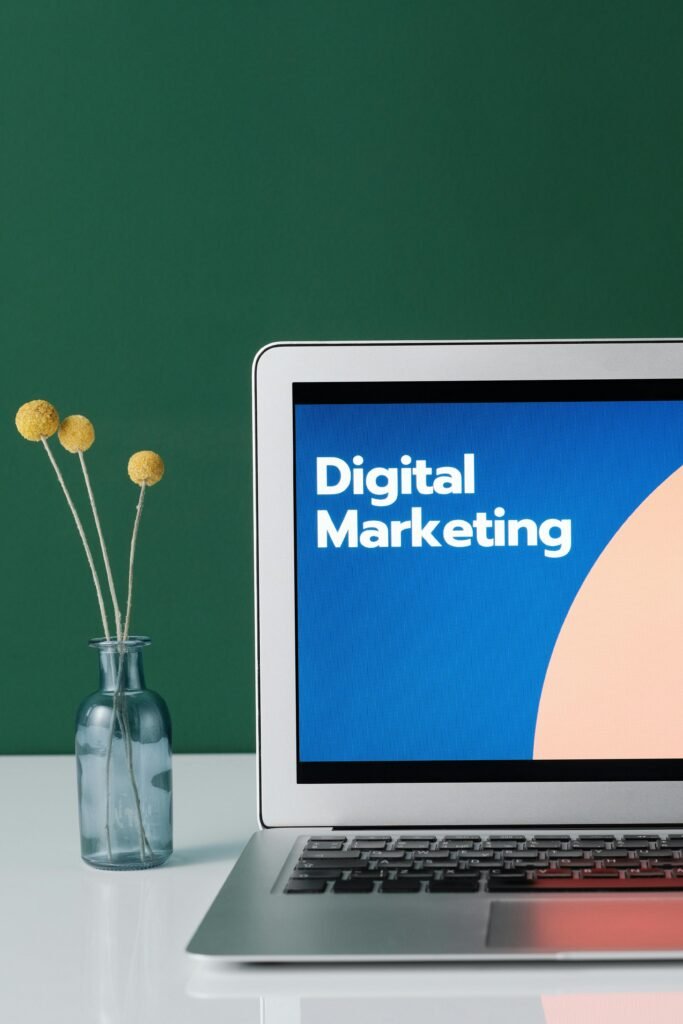In this more and more interlinked world, digital marketing has become an indispensable aspect for businesses aiming to expand, connect with their audience, and remain competitive. It refers to the use of digital venues such as websites, social networking sites, email, or search engines to promote goods, services, or brands. Digital marketing allows business activities the ability to communicate over a greater geographical area while providing an opportunity for detailed and measurable results, which are often very difficult to achieve with conventional marketing forms.

The Dawn of Digital Marketing
The Internet’s augmented digital technologies have revolutionized the marketing landscape. Earlier, marketing was about print ads, TV commercials, and billboards; success depended on a company’s visibility-Multiplying. But digital marketing leveled the playing field by allowing companies, irrespective of size, to compete to catch the eye of online consumers in newer and more creative ways.
In the early 2000s, companies began creating their presence in websites and using email marketing. This landscape, however, was Andrews as social media platforms like Facebook, Instagram, LinkedIn, and Twitter became popular and Google and started gaining prominence. Companies are now utilizing data analytics, artificial intelligence, and automation tools for better campaign optimization and personalized customer experiences.
Key Components of Digital Marketing
Digital marketing is multifaceted, employing a variety of strategies towards different purposes; some key components include the following:
- Search Engine Optimization (SEO): is the process of optimizing a website to ensure it ranks at the top on search engine results pages (SERPs), such as Google; including improving the visibility, attracting organic traffic toward sites through use of relevant articles, keywords, content, technical optimization (for example, fast loading time, mobile-friendliness).
- Content Marketing: The content marketing strategy includes the creation and distribution of valuable, relevant content for drawing and engaging one particular audience group. The content could be in the form of blog posts, graphics or info graphics, podcasts, case studies, eBooks, etc Basically, content marketing builds thought leadership and brand trust for nurturing customer relationships.
- Social Media Marketing: The social media marketing network has at its disposal a multitude of platforms including Instagram, Facebook, LinkedIn, and TikTok to engage with consumers. Social media marketing comprises organic strategies (for example, posting on Open) and paid strategies (for example, Facebook Ads). Community building brings custom service benefits by giving influencer partnerships for brand promotion and sales.
- Email Marketing: Email marketing is another strong tool for performing customer relationship management activities. The personalization in the message delivery with the audience segment depends on behaviors, preferences, characteristics, age, etc.
- Pay-Per-Click (PPC): Advertisers are charged a fee each time someone clicks on one of their ads. As a model, this is targeted to different keywords, demographics, and region, drawing lots of precisely targeted traffic to a website. PPC is a method of obtaining immediate traffic, mainly for new businesses or for seasonal campaigns.
- Affiliate Marketing: Affiliate marketing is partnering with third-party influencers or affiliates who do the promotion of the products in exchange for a percentage of sales. This type of performance marketing allows businesses to expand wearing through trusted voices by only paying for sales or conversions that happen.
- Influencer Marketing: Influencer marketing is based on the fact that an influencer has popularity and trust for their followers. Brand marketers therefore leverage the popularity and trust.
Digital Marketing Benefits for Business
The influence of digital marketing on the business is profound with ample benefits;
1. Worldwide Reach
All sorts of businesses, irrespective of the scale, can now expand their reach across the globe. Sometimes it does not depend on whether you are marketing locally or internationally. Digital platforms help scale up the marketing efforts globally.
2. Cost-Effectiveness
Digital marketing is considered cheaper than traditional platforms of marketing (e.g., television ads, print media). Thus it is accessible for small businesses and startups with a limited amount of budget to execute very targeted and effective campaigns.
3. Personalization
Digital marketing allows the personalization of experiences based on customer data. By means of analytics, a business can segment its audience and deliver content, advertising, and offers more individually suited to a person- ideal in getting consumer engagement and, thus, a positive effect on conversion rates.
4. Engagement and Interaction
Digital marketing allows two-way communication to happen between the businesses themselves and the customers. Through social media accounts, old channels like live chat in websites, and email, they can have the opportunity to engage with their consumers by answering their questions and concerns right away.
5. Flexibility
In brief, digital marketing campaigns can be altered and even paused, keeping businesses updated and meeting changes in market trends, customer behaviors, or directions in any segment of the marketing budget.
The Future of Digital Marketing
The development of more automation tools will simplify marketing processes by enhancing campaign management and bringing overall efficiencies.
- Voice Searches: Voice searches by including smart speakers like Amazon Alexa and Google Assistant are rapidly on the increase; the agent will thus optimize voice search to stay ahead in the market. The future of automation tools may keep on streamlining marketing efforts, enabling businesses to better manage their campaigns and achieve higher efficiencies.
- Optimization for Voice Search: Smart speakers like Amazon Alexa and Google Assistant are very popular. In fact, the reason that businesses wanting to stay trendy will have to optimize for voice search is because of that Coca-Cola method.
- Lasting Video Marketing Growth: Video content remains more popular than ever, across platforms like platforms such as YouTube, TikTok, and Instagram Reels providing the premise for larger video content growth. Expect short-form videos followed by live broadcast options to strongly withstand time in digital marketing strategies in the future.
- Augmented Reality (AR): This kind of platform really affects interaction with the product within the customer. Major brands will come up with fundamentally new applications for AR in the immersive segment such as try-on and product demonstrations on web sites.
Conclusion
Digital marketing has completely changed how businesses connect with audiences and grow their brands. By employing effective initiatives, such as the following: SEO, content creation, social media interaction, and environmentally aware email campaigns, companies can achieve greater accuracy in meeting objectives. The upcoming wave of digital marketing depends on the growth of technology, coupled with changes in consumer behavior; however, it hinges on solidifying relationships.



